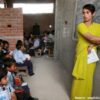How independent education industry is a major source of employment in India
 – Raghav Poddar, Chairman, western regional committee (Maharashtra), FICCI Arise
– Raghav Poddar, Chairman, western regional committee (Maharashtra), FICCI Arise
Educational institutions play a crucial role in the development of a child, society, and the world at large. It has always been found that the countries with the highest economies are backed up and supported by robust education systems.
Owing to the COVID-19 outbreak, 1.6 billion children in 161 countries stayed out of schools as of March 28, 2020 and this number is close to 80 percent of the world’s total students enrolled in schools.
Like other countries, in India too, schools had no option but to shut down their buildings to safeguard the lives of students and teachers and to control the spread of the outbreak. The closure is bound to have a strong impact as nobody knows how long it could last and also because it happened during the crucial period of the beginning of the academic year.
On the demand side, the ILO report says that coronavirus pandemic could trigger a global economic crisis and destroy up to 195 million jobs around the world if governments do not act fast to shield workers from the impact. Till a few months back we were discussing the impact of Industry 4.0 on employment, but over the past weeks, the COVID-19 pandemic has presented unique challenges to all types and levels of learning, including schooling, TVET, apprenticeships, and skills development. Due to this crisis not only is the health of millions of people at risk but work has being profoundly affected and also at stake are their long-term livelihoods and wellbeing.
At a very basic estimate, there are over 3.03 lakh unaided private schools in the country, which provides direct employment to approx. 3 crore people which comprises of teaching, non-teaching and support staff. This translates into livelihood to 12-15 crore citizens of the country, making education one of the top 5 employment providers in the country.
The closure of school buildings has forced many educational institutions to move to online teaching using both synchronous and asynchronous modes of instruction, and how wonderfully teachers and students have risen to the occasion. To ensure continuous and seamless learning, the teachers and faculty members are spending much more time than usual to plan, learn, adapt, and deliver online classes. They have risen to the call of their duty in these unprecedented times only to be faced with the uncertainty of salary payments / continued employability.
Furthermore, it is important and in the best interest of students that schools are able to maintain their original character during these unprecedented times. So, when the students finally return to campuses, schools should be able to deliver the same offerings to students what they were enjoying before the lockdown.
In order to ensure the same, schools have to necessarily maintain their staff and infrastructure and to be able schools and protect the livelihood of the people who are equal citizens of the country, society should refrain from knee jerk reactions often fueled by populist and misguided activism being perpetrated by a mere handful of people with vested interests. Breaking of fee collection cycle will break the spine that is unaided budget private schools. The need of the hour is to protect schools, parents and the learner community.
Schools on their own have been mindful of the economic challenges that certain parental households are undergoing due to the lockdown and have been pro-active to provide relief to the extent feasible and sustainable. At the same time schools have been working overtime to ensure that they transcend to on-line learning and keep intact their academic resources and staff community. In the midst of all these, several circulars have been issued in quick succession raising confusion and false hope among the parent community and have put the continuance of school operations at severe threat. Besides student fees, unaided private schools do not have any other source of revenue.
The strength of a nation is directly proportional to the quality of its teachers – they have the future of the country in their hands. Teaching is the only profession that creates every other profession in the world, and I have long argued that India should attract her best minds into the teaching profession. We are blessed with one of the richest cultures in the world that taught us “Guru Devo Bhava”, our Gurus are next to God. As a country, we are failing to attract the brightest talents into the teaching profession and it is essential, now so more than ever that we bring back the respect and reverence for our Gurus. Our future literally depends on it!
The views, thoughts, and opinions expressed in the article belong solely to the author, and not necessarily reflect the views, thoughts, and opinions of EducationWorld.
Also read: From alternate to mainstream – Edtech is fast changing the face of education

















Add comment